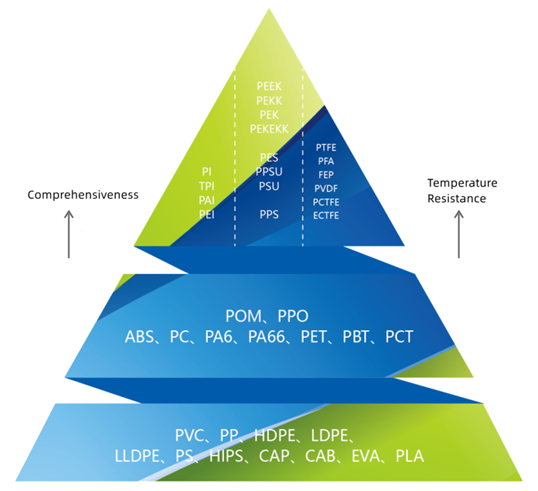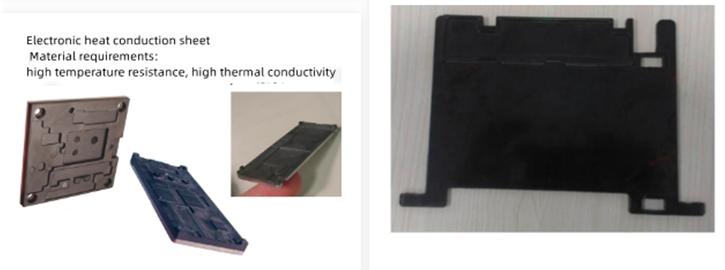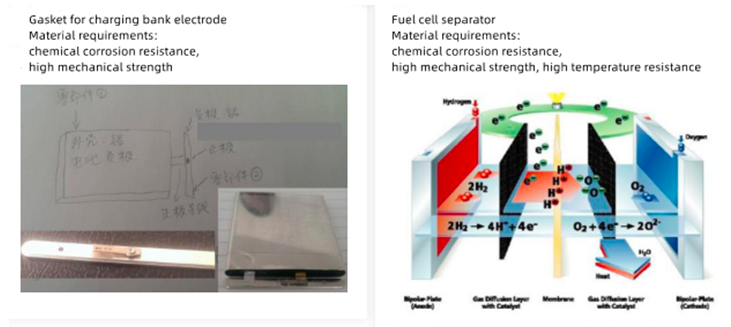©Copyright 2019 SIKO POLYMERS (SUZHOU) CO., LTD All rights reserved.Site Map Powered by iwonder.cn
- Email Uskevin@sikopolymers.com


In recent years, the application of special engineering plastics has gradually extended from the previous military and aerospace fields to more and more civilian fields, such as automobiles, equipment manufacturing, and high-end consumer goods. Among them, polyphenylene sulfide (PPS) and polyetheretherketone (PEEK) are two kinds of special engineering plastics with relatively rapid development and wide application range.
PEEK is superior to PPS in terms of strength, toughness, and maximum working temperature. In terms of high temperature resistance, PEEK's temperature resistance is about 50°C higher than that of PPS. On the other hand, the relatively obvious cost advantage and better processing performance of PPS make it more widely used.

PPS has the following performance advantages:
(1) Intrinsic flame retardant
Different from PC and PA, PPS pure resin and its glass fiber/mineral powder filled composites can easily achieve V-0 @ 0.8mm or even thinner thickness V-0 flame retardant without adding any flame retardant level. Although PC and PA have cheaper prices and better mechanical strength (especially impact strength) than PPS, the cost of PC and PA composites with halogen-free flame retardant formulations (V-0@0.8mm level) is higher than that of PPS. It will rise sharply, and in many cases even higher than PPS materials with the same mechanical strength.
(2) Ultra-high liquidity
In the application field of notebook cover, this advantage is more obvious than that of PC. A higher addition amount will not only seriously affect the fluidity of the material and cause processing difficulties, but also cause problems such as surface floating fibers, serious warpage, and poor mechanical properties. For semi-crystalline PPS, its very high fluidity allows the glass fiber filling to easily exceed 50 %. At the same time, in the process of high temperature melt blending and extrusion, the lower viscosity of PPS compared to PC can make Glass fibers undergo lower levels of shear and extrusion, resulting in a longer retention length in the final injection molded article, which further increases modulus.
(3) Ultra-low water absorption
This advantage is mainly for PA. In terms of fluidity, highly filled PA and PPS are comparable; and for mechanical properties, PA composites with the same filling amount are even more dominant. The result is that the defect rate of PPS products due to water absorption deformation is much lower than that of PA products under the same conditions.
(4) Unique metal texture and higher surface hardness
Through the combination of special molds and reasonable mold temperature, PPS injection molding parts will also emit a sound similar to hitting metal under the touch of human hands, and the surface will be as smooth as a mirror, with a metallic luster.



PEEK has the following outstanding properties:
(1) Extremely high heat resistance.
It can be used for a long time at 250°C, the temperature can reach 300°C in an instant, and it hardly decomposes in a short time at 400°C.
(2) Excellent mechanical properties and dimensional stability.
PEEK can maintain high strength at high temperature. The bending strength at 200°C can still reach 24 MPa, and the bending strength and compressive strength at 250°C can reach 12-13 MPa. It is especially suitable for manufacturing continuous products at high temperature. working components. PEEK has high rigidity, good dimensional stability and low coefficient of linear expansion, which is very close to metal aluminum. In addition, PEEK also has good creep resistance, can withstand great stress during the service period, and will not cause significant extension due to the extension of time.
(3) Excellent chemical resistance.
PEEK resists most chemicals well, even at high temperatures, with corrosion resistance similar to nickel steel. Under normal circumstances, the only thing that can dissolve PEEK is concentrated sulfuric acid.
(4) Good hydrolysis resistance.
Resistant to chemical damage by water or high-pressure water vapor. Under the condition of high temperature and high pressure, PEEK components can work continuously in water environment and still maintain good mechanical properties. Such as continuous immersion in water at 100°C for 200 days, the strength remains almost unchanged.
(5) Good flame retardant performance.
It can reach UL 94 V-0 rating, is self-extinguishing, and emits less smoke and toxic gases under flame conditions.
(6) Good electrical performance.
PEEK maintains electrical properties over a wide frequency and temperature range.
(7) Strong radiation resistance.
PEEK has a very stable chemical structure, and PEEK parts can work well under high doses of ionizing radiation.
(8) Good toughness.
Fatigue resistance to alternating stress is the best of all plastics and is comparable to alloys.
(9) Excellent friction and wear resistance.
High wear resistance and low coefficient of friction are maintained at 250°C.
(10) Good processing performance.
Easy extrusion and injection molding, and high molding efficiency.